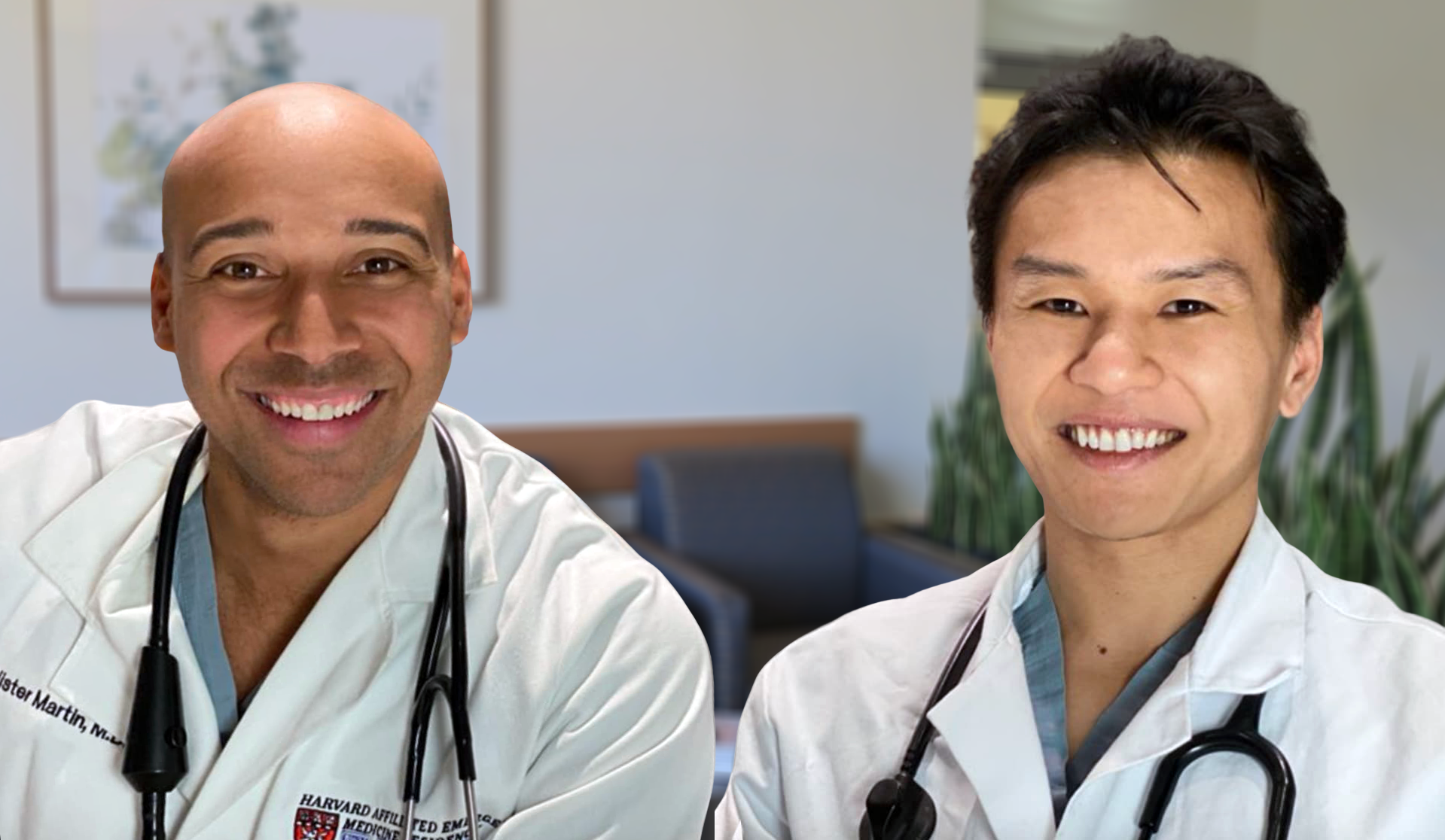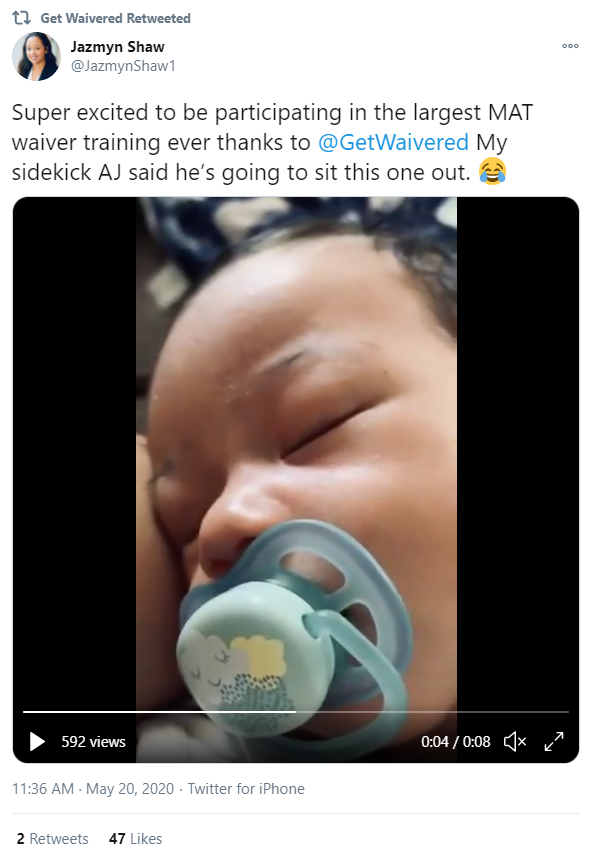News & Updates — Grantee Spotlight
Grantee Spotlight: Encouraging Physicians to Treat Opioid Use Disorder in Emergency Departments Across the U.S.
November 13, 2020Although emergency department (ED) physicians see more patients with opioid use disorder (OUD) than other specialists and play a pivotal role in saving those who have overdosed, they have been far less involved in initiating OUD treatment. This is despite evidence that opioid use and overdoses have increased during the pandemic. Research suggests that as of 2017, fewer than 7 percent of emergency departments nationwide had protocols in place to deliver medication for OUD and in 2015 fewer than 1 percent of ED physicians had the waiver needed to prescribe buprenorphine, one of the most common OUD medications.
With funding from FORE, two ED physicians at Massachusetts General Hospital (MGH) are leading a national effort to encourage emergency medicine clinicians to get these waivers. The Get Waivered campaign leverages social media platforms such as Facebook, Twitter, and Instagram, as well as behavioral science principles, to make the case for getting waivered and to streamline the process. We spoke to the two physicians, Alister Martin, M.D., M.P.P., founder of Get Waivered, and Shuhan He, M.D., the program’s digital growth director, about their strategy.

Dr. Martin, what motivated you to launch a campaign to get ED physicians waivered?
Martin: At the start of my residency training in 2015, one of the first patients I took care of in the ED was a mother of two who was addicted to prescription opioids and wanted recovery treatment for her addiction. She came to us for help and we couldn’t do anything for her because we didn’t have any protocols in place for patients looking to get help overcoming their addiction and no one working that Friday night was waivered to prescribe buprenorphine. Moreover, the clinic that could help her wasn’t going to open until Monday morning. With the biology of this disease, people can’t wait days. So that for me was the start of the Get Waivered campaign.
You began with your colleagues at MGH and were incredibly successful — going from just one ED physician who was waivered in your department to 95 percent having the waiver in just four months. How did you do it?
Martin: My background is in behavioral economics, which provides a useful lens for understanding human behavior. What we saw happening in emergency departments was a perfect example of what behavioral scientists call the action-intention gap. Doctors intended to take good care of patients but weren’t following through and taking the necessary actions to do so, including getting waivered. In interviews, we found three reasons: they found the process of getting waivered cumbersome; they didn’t have the sense it was the norm to have the waiver and didn’t want to stick their necks out; and they never saw the impact of treating patients with medication. The latter is really important because ED physicians tend to see people in crisis: patients who are in withdrawal, or have relapsed, or overdosed. Based on that experience, we tell ourselves this narrative that everyone who has opioid addiction is bound to overdose, relapse, or withdraw. We don’t see the counterfactuals — the people who succeed in recovery.
What was your strategy for overcoming each of these barriers?
Martin: We knew we needed to make the process of getting waivered easier so we created a single website where people could go and with the click of a button get enrolled in a course. We also knew we needed to overcome the notion that nobody else seemed to be getting waivered. At MGH, we started by getting authority figures involved, recruiting the chair and the medical directors of the department as early champions to advocate for and, ultimately, get their waivers. We then helped them select a group of five other influential faculty members in our department to get it as well. Then we brought them to a faculty meeting and said, “These people are in the first waiver class. Who else wants to be on board?” Your boss is there, your favored colleagues are there, and folks you admire professionally have taken the leap, so this increases the chances you’ll consider doing so as well. The last piece was we brought patients who we’d helped back — the ones who were “frequent fliers” in the ED, the folks providers thought had died or overdosed or were in long-term rehab or on disability because they never saw them again. I remember one man who came back in a suit and tie and said, “This is my second most important speech I’ve given this week. The most important was why my girlfriend should marry me. She said yes.” These kinds of stories are really powerful because as humans, we tend to follow through on behaviors where the outcome of the action is more apparent or salient.

The funding you received from FORE was designed to help you scale the program nationwide. How’s it going?
Martin: Before the pandemic, our plan was to offer high-touch, intensive, in-person waiver training. We had reached 2,000 people in Massachusetts, Nebraska, and Texas, but when COVID-19 struck, we had to pivot quickly. We partnered with Providers Clinical Support System, a national training program focused on evidence-based treatments for patients with OUD, to offer the waiver training via Zoom.
He: Moving to a remote-only platform has allowed us to scale more quickly. Rather than courses with 20 to 30 providers attending in person, we were able to enroll 1,200 in the May 2020 course, breaking the Zoom cap of 1,000 people. We’ve also been able to reach more states. We have programs coming up in California, Ohio, Michigan, and Illinois. Having that many people in a single class creates some challenges, including managing questions. We learned we needed to identify the most common ones and have pre-written answers. We’re also using polls to make sure people are engaged. The remote approach has had a great equalizing effect, enabling people in rural communities to participate without traveling to big cities and allowing parents with young children to attend. The stories of people being able to attend the class while caring for children — and the accessibility, honestly, has been one of the best parts of this.
How have social media tools advanced your campaign?
He: We know that ED physicians and those in training spend a lot of time on the internet looking for information on the standard of care and how to be a better doctor so we hit every single front with our message, using everything from Facebook and Instagram to educational websites and trusted sources like ALiEM.com, an educational platform for ED physicians that I’m involved with. We’ve also enlisted ambassadors from across the medical profession including physician assistants, medical students, and physicians, who share their experience with the waiver course. This is what enabled us to recruit so many people for the first remote training.
FORE partnered your campaign with two of its other grantees, the California Bridge Emergency Department Initiative and the Emergency Medicine Foundation of the American College of Emergency Physicians. How are the three organizations working together?
Martin: All three of us are part of a consortium that aims to revolutionize the way EDs treat opioid addiction. We each have a very specific role to play. Our group primes the pump by getting as many people waivered as possible. The California Bridge programs provides technical assistance to physicians who are just getting started prescribing medication for OUD, helping them to manage dosing and know what to do when someone enters withdrawal, for instance. The Emergency Medicine Foundation is building quality improvement tools so that physicians can earn financial incentives under Medicare’s Merit-Based Incentive Payment System if they become waivered.
Dr. Martin, you took a break in medical school to get a master’s degree in public policy from Harvard University’s Kennedy School of Government. What role do you see for state and federal policymakers in accelerating this work?
Martin: The most important thing would be for the federal government to get rid of the waiver requirement for prescribing buprenorphine. We write prescriptions for fentanyl with no extra training required. Barring that, states have an important role to play in expanding the types of health care professionals who can get the waiver. Massachusetts was ahead of the country in allowing nurse practitioners and other mid-level practitioners to become waivered and that has broadened access dramatically. The third thing I would suggest would be incentivizing waiver training by paying providers for the time it takes to get a waiver. It’s not just the eight hours of training. There’s a big administrative burden and this might encourage providers who are on the fence about entering into this work.
How have you partnered with states thus far?
Martin: Thus far we’ve partnered with seven states — California, Illinois, Massachusetts, Michigan, Nebraska, Ohio, and Texas. We help create the administrative capacity for Zoom sessions and make sure they go off without a hitch. We also offer a lot of tools for promoting waiver training, including social media content, such as text, infographics, and imagery, so it’s easy for them to let everyone in their networks know about upcoming training. We very much respect the folks who are on the ground and think they are the best group to do be doing outreach on the backend and to provide information after training on the types of resources that are available to waivered clinicians, including places to refer patients for ongoing care. I worked for the governor of Vermont for a year and saw firsthand what a remarkable role the states can play in addressing opioid addiction.
He: We see our role as helping to scale solutions and it’s so important now as we see increasing rates of complications from opioid use in the ED. By getting waivered, we have a chance to intervene in someone’s life and really change it.
Are you a healthcare provider looking to obtain your waiver to prescribe medications for opioid use disorder? Please visit Get Waivered to sign up for training today!